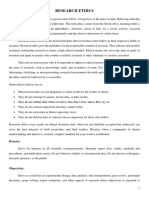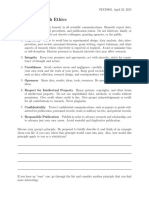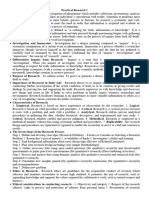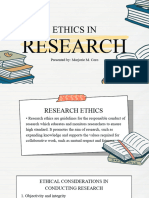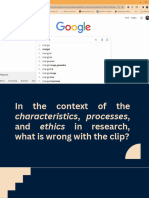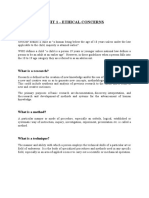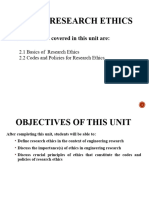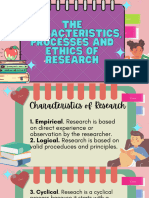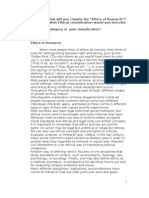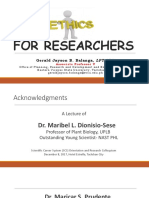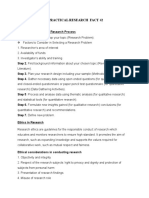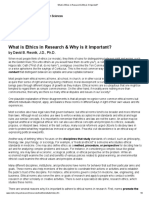0 ratings0% found this document useful (0 votes)
10 viewsResearch Ethics
Research Ethics
Uploaded by
Monica Tianelaethics
Copyright:
© All Rights Reserved
Available Formats
Download as PPTX, PDF, TXT or read online from Scribd
Research Ethics
Research Ethics
Uploaded by
Monica Tianela0 ratings0% found this document useful (0 votes)
10 views12 pagesethics
Original Title
Research ethics
Copyright
© © All Rights Reserved
Available Formats
PPTX, PDF, TXT or read online from Scribd
Share this document
Did you find this document useful?
Is this content inappropriate?
ethics
Copyright:
© All Rights Reserved
Available Formats
Download as PPTX, PDF, TXT or read online from Scribd
Download as pptx, pdf, or txt
0 ratings0% found this document useful (0 votes)
10 views12 pagesResearch Ethics
Research Ethics
Uploaded by
Monica Tianelaethics
Copyright:
© All Rights Reserved
Available Formats
Download as PPTX, PDF, TXT or read online from Scribd
Download as pptx, pdf, or txt
You are on page 1of 12
RESEARCH ETHICS
Ethics generally is considered to deal with
beliefs about what is right or wrong, proper or
improper, good or bad. According to a dictionary
definition (Webster‘s 1968), to be ethical is to
conform to accepted professional practice .
Research ethics provides guidelines
for the responsible conduct of research.
In addition, it educates and monitors
scientists conducting research to ensure
a high ethical standard.
Ethics should be applied in all stages
of research from planning, to gathering
of data, to the analysis and
interpretation and evaluation (oral
examination) of the research.
1. Honesty: Honestly report data, results,
methods and procedures, and publication
status. Do not fabricate, falsify, or
misrepresent data.
2. Objectivity: Strive to avoid bias in
experimental design, data analysis, data
interpretation, peer review, personnel
decisions, grant writing, expert testimony, and
other aspects of research.
3. Integrity: Keep your promises and
agreements; act with sincerity; strive for
consistency of thought and action.
4. Carefulness: Avoid careless errors
and negligence; carefully and critically
examine your own work and the work of
your peers. Keep good records of
research activities.
5. Openness: Share data, results, ideas, tools,
resources. Be open to criticism and new ideas.
6. Respect for Intellectual Property: Honor
patents, copyrights, and other forms of
intellectual property. Do not use unpublished data,
methods, or results without permission. Give
credit where credit is due. Never plagiarize.
7. Confidentiality: Protect confidential
communications, such as papers or grants
submitted for publication, personnel records,
trade or military secrets, and patient records.
8. Responsible Publication: Publish in order to
advance research and scholarship, not to
advance just your own career. Avoid wasteful
and duplicative publication.
9. Responsible Mentoring: Help to
educate, mentor, and advise students.
Promote their welfare and allow them to
grow.
10. Social Responsibility: Strive to
promote social good and prevent or
mitigate social harms through research,
public education, and advocacy.
11. Non-Discrimination: Avoid discrimination
against colleagues or students on the basis of sex,
race, ethnicity, or other factors that are not related
to their scientific competence and integrity.
12. Competence: Maintain and improve your own
professional competence and expertise through
lifelong education and learning; take steps to
promote competence in science as a whole.
13. Legality: Know and obey relevant laws and
institutional and governmental policies.
14. Animal Care: Show proper respect and care
for animals when using them in research. Do not
conduct unnecessary or poorly designed animal
experiments.
15. Human Subjects Protection: When
conducting research on human subjects, minimize
harms and risks and maximize benefits; respect
human dignity, privacy, and autonomy.
RESEARCH
MISCONDUCTS
(a) Fabrication - making up data or results and
recording or reporting them.
(b) Falsification - manipulating research materials, or
changing or omitting data or results such that the
research is not accurately represented in the research
record.
(c) Plagiarism - the appropriation of another person's
ideas, processes, results, or words without giving
appropriate credit.
You might also like
- What Is Research EthicsDocument8 pagesWhat Is Research Ethicsakif khanNo ratings yet
- Research EthicsDocument3 pagesResearch EthicsAIMAN KINZA BS EnglishNo ratings yet
- Ethics: Research EthicsDocument3 pagesEthics: Research EthicsAllan Oliver PollienteNo ratings yet
- Research Is car-WPS OfficeDocument3 pagesResearch Is car-WPS OfficeFredrick EmilNo ratings yet
- Characteristics and Ethics in ResearchDocument2 pagesCharacteristics and Ethics in ResearchGwen MonjeNo ratings yet
- Ethics and Integrity of ResearchDocument12 pagesEthics and Integrity of ResearchLovelene ChrizzeNo ratings yet
- Ethical Standards in Conducting A Research: HonestyDocument3 pagesEthical Standards in Conducting A Research: HonestyKate Angeline De SagunNo ratings yet
- Research Ethics, Plagiarism and FraudDocument53 pagesResearch Ethics, Plagiarism and FraudWisnu Adi SaputroNo ratings yet
- Research EthicsDocument18 pagesResearch EthicsJocelyn DiamponNo ratings yet
- Honesty:: Research Ethics Provides Guidelines For The Responsible Conduct of Research. in Addition, It Educates andDocument2 pagesHonesty:: Research Ethics Provides Guidelines For The Responsible Conduct of Research. in Addition, It Educates andCatherine Rivera100% (1)
- Chapter 7 Ethics in ResearchDocument12 pagesChapter 7 Ethics in ResearchGatluak Thalow KuethNo ratings yet
- Broad Area Problem, Research EthicsDocument4 pagesBroad Area Problem, Research EthicsjihadajNo ratings yet
- Lesson 2Document2 pagesLesson 2Annalie Delera CeladiñaNo ratings yet
- Professional StandardsDocument3 pagesProfessional StandardsbooklovershilpaNo ratings yet
- RESEARCH PointsDocument10 pagesRESEARCH Pointszeemal tayyab100% (1)
- Practical Research 1Document3 pagesPractical Research 1ai vyNo ratings yet
- Ethics in ResearchDocument10 pagesEthics in ResearchMarjorie CoroNo ratings yet
- Lesson 2 PR1Document25 pagesLesson 2 PR1Clarenz Ken TatierraNo ratings yet
- 2 Characteristics Process and Ethics of ResearchDocument16 pages2 Characteristics Process and Ethics of ResearchE.J. DiezNo ratings yet
- Unit 1 Ethical ConcernsDocument10 pagesUnit 1 Ethical ConcernsDhruv ShahNo ratings yet
- Research Ethics: Research Ethics Involves The Application of Fundamental Ethical Principles To A VarietyDocument4 pagesResearch Ethics: Research Ethics Involves The Application of Fundamental Ethical Principles To A Varietywali ahmedNo ratings yet
- Lesson 4 Research-EthicsDocument5 pagesLesson 4 Research-EthicsMarie Frances SaysonNo ratings yet
- 87 - Kaustubh ShrivastavaDocument4 pages87 - Kaustubh ShrivastavaRohan HiremathNo ratings yet
- Ethics of ResearchDocument10 pagesEthics of ResearchAiman Ameer PiaNo ratings yet
- Ethics in ResearchDocument30 pagesEthics in ResearchAMNAH EID ALATAWI100% (1)
- Theoretical and Conceptual FrameworksDocument4 pagesTheoretical and Conceptual FrameworksLiana HoNo ratings yet
- Educational Influence: & Education & Teaching Determine Cultural About Unknown Principles and CrossingDocument8 pagesEducational Influence: & Education & Teaching Determine Cultural About Unknown Principles and CrossingalfatihahrenoNo ratings yet
- ThreeDocument9 pagesThreejycm2001No ratings yet
- Unit 2 Research EthicsDocument17 pagesUnit 2 Research Ethicsesubalew molalgnNo ratings yet
- Lesson 1 PR1Document11 pagesLesson 1 PR1Mark Joseph GarciaNo ratings yet
- PR1 Lesson 2Document4 pagesPR1 Lesson 2Norania MacarayaNo ratings yet
- PR1Document12 pagesPR1bendanomarky8No ratings yet
- Research EthicsDocument7 pagesResearch Ethicsrutendotakafuma92No ratings yet
- The Characteristic, Process and Ethics of ResearchDocument38 pagesThe Characteristic, Process and Ethics of Researchrizal.teacher05No ratings yet
- Reviewer PR 1Document16 pagesReviewer PR 1Aseana EscotoNo ratings yet
- Final Assignment No. 2 Research in EducationDocument26 pagesFinal Assignment No. 2 Research in EducationAbdul GhafoorNo ratings yet
- The RationaleDocument27 pagesThe Rationalerizza.comeNo ratings yet
- Full Practical Research 1 2024Document52 pagesFull Practical Research 1 2024Beverly Centino IINo ratings yet
- Research EthicDocument20 pagesResearch Ethicigna ana dimcoNo ratings yet
- PR 1Document11 pagesPR 1Brull BanjawanNo ratings yet
- Lecture 5 EHSDocument30 pagesLecture 5 EHSazaaabdelgwad97No ratings yet
- Unit II PH.DDocument36 pagesUnit II PH.DnareshNo ratings yet
- Nature of Inquiry and ResearchDocument10 pagesNature of Inquiry and ResearchMarvin CanamanNo ratings yet
- Lesson 4 Research EthicsDocument17 pagesLesson 4 Research EthicswishcariagaNo ratings yet
- Research Module 2 CHARACTERISTICS, PROCESSES, AND ETHICS IN RESEARCHDocument2 pagesResearch Module 2 CHARACTERISTICS, PROCESSES, AND ETHICS IN RESEARCHcandy lollipoNo ratings yet
- wk13 ETHICS IN RESEARC1Document2 pageswk13 ETHICS IN RESEARC1itulejamesNo ratings yet
- Updated Ethics For Research 2022Document47 pagesUpdated Ethics For Research 2022rhea venigasNo ratings yet
- Fact Sheet 2Document4 pagesFact Sheet 2Celesty JasminNo ratings yet
- What Is Ethics in Research & Why Is It ImportantDocument9 pagesWhat Is Ethics in Research & Why Is It ImportantAnonymous zR8P8LexNo ratings yet
- The Nature of Inquiry and ResearchDocument33 pagesThe Nature of Inquiry and ResearchJuliet HipolitoNo ratings yet
- HVE Unit-5 NewDocument54 pagesHVE Unit-5 NewArul DNo ratings yet
- Practical Research 1 NotesDocument12 pagesPractical Research 1 Notesmialicera3No ratings yet
- Helluuarr!!Document12 pagesHelluuarr!!zhazhanicolecondeNo ratings yet
- Role of Ethics in ResearchDocument3 pagesRole of Ethics in ResearchDiana Wangamati100% (1)
- PPT-PR1-Nature of Inquiry CHARACTERISTICSDocument61 pagesPPT-PR1-Nature of Inquiry CHARACTERISTICSstephanie maloloyonNo ratings yet
- Lesson 2Document6 pagesLesson 2silvaeddisoiNo ratings yet
- Codes and Policies For Research EthicsDocument17 pagesCodes and Policies For Research EthicskarimovNo ratings yet
- EthicsDocument37 pagesEthicsMisheck MarengaNo ratings yet
- Gale Researcher Guide for: Overview of Research Methods and Statistics in PsychologyFrom EverandGale Researcher Guide for: Overview of Research Methods and Statistics in PsychologyNo ratings yet
- Nature of Inquiry and ResearchDocument17 pagesNature of Inquiry and ResearchMonica TianelaNo ratings yet
- Disaster and Its EffectsDocument26 pagesDisaster and Its EffectsMonica TianelaNo ratings yet
- Disaster Preparedness DrillDocument5 pagesDisaster Preparedness DrillMonica TianelaNo ratings yet
- Basic Concept of Disaster and Disaster RiskDocument18 pagesBasic Concept of Disaster and Disaster RiskMonica TianelaNo ratings yet
- Writing An Effective SpeechDocument15 pagesWriting An Effective SpeechMonica TianelaNo ratings yet
- De Thi AVCN2 - 7-2022Document7 pagesDe Thi AVCN2 - 7-2022vu965796No ratings yet
- ניתוצ תירגול 4 - 2023Document35 pagesניתוצ תירגול 4 - 2023mafiadaniel5No ratings yet
- Elliott Tube CleanersDocument28 pagesElliott Tube CleanersIslam Hosny MohamedNo ratings yet
- Liquid Culture Kit: Please Read Before You BeginDocument2 pagesLiquid Culture Kit: Please Read Before You BeginNon DscriptNo ratings yet
- VUM006 - Abacus 5 User Manual 2.6Document153 pagesVUM006 - Abacus 5 User Manual 2.6Shishir AhmedNo ratings yet
- EDC-Unit Wise Revision Test QPDocument4 pagesEDC-Unit Wise Revision Test QPDr G Hari KrishnanNo ratings yet
- Connectrix - Brocade Departmental Firmware Upgrade Procedures-DS-6520BDocument18 pagesConnectrix - Brocade Departmental Firmware Upgrade Procedures-DS-6520BPogsitNo ratings yet
- Managing Data Growth in Oracle E-Business Suite With Data Archiving and Test Data ManagementDocument24 pagesManaging Data Growth in Oracle E-Business Suite With Data Archiving and Test Data ManagementSuresh SelvarajNo ratings yet
- Chapter 6 Transportation, Transshipment, and Assignment ProblemsDocument36 pagesChapter 6 Transportation, Transshipment, and Assignment ProblemsChinish KalraNo ratings yet
- 2.488Gbps SFP Optical Transceiver, 300m Reach: DS-SFP-FC-2G-SWDocument8 pages2.488Gbps SFP Optical Transceiver, 300m Reach: DS-SFP-FC-2G-SWtv_romeoNo ratings yet
- Semana 2 Ingles Tecnico - PDF Grupo 2Document5 pagesSemana 2 Ingles Tecnico - PDF Grupo 2estherNo ratings yet
- Estimasi Piping Accessories and Bulk Material For First Firing Unit #1Document4 pagesEstimasi Piping Accessories and Bulk Material For First Firing Unit #1Arif BinorikaNo ratings yet
- Materials and Design: Xiaojun Gu, Yinfeng Cao, Jihong Zhu, Jun Wang, Weihong Zhang, Ziad MoumniDocument16 pagesMaterials and Design: Xiaojun Gu, Yinfeng Cao, Jihong Zhu, Jun Wang, Weihong Zhang, Ziad MoumnidenisNo ratings yet
- MAT188H1 - 20219 - 631642212175midterm I-Part B-SolutionDocument3 pagesMAT188H1 - 20219 - 631642212175midterm I-Part B-SolutionYusuf MahdiNo ratings yet
- 968 - FSP - 1199 - 05 - 22 - en - El Safety ManualDocument1 page968 - FSP - 1199 - 05 - 22 - en - El Safety ManualArash SepahvandNo ratings yet
- Prestigio p179Document25 pagesPrestigio p179scribd5sNo ratings yet
- LMindConn MQTT DOKU 1-0 enDocument78 pagesLMindConn MQTT DOKU 1-0 enshlakiNo ratings yet
- Sum and Product of Roots Worksheet 1Document5 pagesSum and Product of Roots Worksheet 1Francis Ho HoNo ratings yet
- R7426A Temperature Controllers: With 3-Position Floating Output For Heating and Cooling ApplicationsDocument16 pagesR7426A Temperature Controllers: With 3-Position Floating Output For Heating and Cooling Applicationsvan_dall_2No ratings yet
- Master Thesis Deep LearningDocument7 pagesMaster Thesis Deep Learningstacyjohnsonreno100% (2)
- Genuine Accessories: For The C-ClassDocument56 pagesGenuine Accessories: For The C-ClassRisto KuosmanenNo ratings yet
- Brain Tumor SegmentatioDocument11 pagesBrain Tumor SegmentatioRahul RepalaNo ratings yet
- Standards in PreparationDocument16 pagesStandards in Preparationnitvan82No ratings yet
- Mueller: B-101 and B-100 Drilling and Tapping MachineDocument16 pagesMueller: B-101 and B-100 Drilling and Tapping MachineaurabloodNo ratings yet
- STAT 233 Week 1 - 5 PDFDocument24 pagesSTAT 233 Week 1 - 5 PDFTarek Hajj ShehadiNo ratings yet
- Subject/Course Name: Basic Information and Communication CODE: 5403 Level: Bacleors (B. Ed) Assignment No: PAGES: 26Document26 pagesSubject/Course Name: Basic Information and Communication CODE: 5403 Level: Bacleors (B. Ed) Assignment No: PAGES: 26Muhammad OmerNo ratings yet
- Software Defined Wide Area Network SDWANPrinciplesand ArchitectureDocument13 pagesSoftware Defined Wide Area Network SDWANPrinciplesand Architecturenablaam6829No ratings yet
- 5.define Deadlock. What Are The Necessary and Sufficient Conditions For Deadlock To Occur?Document2 pages5.define Deadlock. What Are The Necessary and Sufficient Conditions For Deadlock To Occur?Deborah oNo ratings yet
- Advanced Architecting On AWS DescriptionDocument2 pagesAdvanced Architecting On AWS DescriptionjitenderNo ratings yet
- Experiment#5 DC Circuit Measurements-Part B: Electrical Circuits Lab 0905212Document8 pagesExperiment#5 DC Circuit Measurements-Part B: Electrical Circuits Lab 0905212aliyahNo ratings yet

